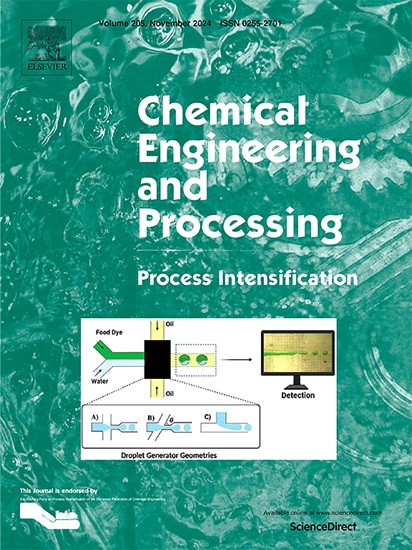Cyclic distillation: a high-efficiency alternative for sustainable propane-propylene separation with reduced cost
IF 3.9
3区 工程技术
Q3 ENERGY & FUELS
Chemical Engineering and Processing - Process Intensification
Pub Date : 2025-07-15
DOI:10.1016/j.cep.2025.110449
引用次数: 0
Abstract
Separation of propane and propylene continues to be one of the petrochemical industry's most energy-demanding processes, with high capital cost, mainly because of the very small boiling point difference between them, which requires very challenging separation methods. Here, cyclic distillation is proposed especially for super fractionators, which provides outstanding separation efficiency while greatly reducing both equipment size and the amount of energy needed. The system realizes 99.9 % high-purity separation of both propane and propylene using 54 trays, compared to 140 trays in conventional systems, a 61 % reduction. Additionally, the reboiler duty is also decreased from 21 GJ/hr to 12 GJ/hr, which is 43 % less in terms of energy usage. The McCabe-Thiele analysis emphasizes the inherent benefits of cyclic operation in which periodic vapor-liquid dynamics make use of beneficial thermodynamic conditions to ensure high separation quality. Periodic operation also boosts internal efficiency by decreasing the pinch effect and accommodating lower flow rates of vapor, which further ensures an energy economy without compromising separation quality. It is the only distillation mode that has both features of continuous distillation as well as batch distillation, bringing about intensified phase contact, better use of energy, as well as enhanced separation efficiency, especially in the case of near-boiling constituents in the system.

循环蒸馏:一个高效的替代可持续丙烷-丙烯分离与降低成本
丙烷和丙烯的分离仍然是石油化工行业最耗能的工艺之一,其投资成本很高,主要是因为两者之间的沸点差非常小,这需要非常具有挑战性的分离方法。在这里,循环精馏是特别针对超级分馏器提出的,它提供了出色的分离效率,同时大大减少了设备尺寸和所需的能量。与传统系统的140个分离塔相比,该系统使用54个分离塔实现了99.9%的丙烷和丙烯的高纯度分离,减少了61%。此外,再沸器的负荷也从21 GJ/hr降低到12 GJ/hr,这在能源使用方面减少了43%。McCabe-Thiele分析强调循环操作的内在好处,其中周期性汽液动力学利用有利的热力学条件来确保高分离质量。周期性操作还通过减少夹紧效应和适应较低的蒸汽流速来提高内部效率,从而进一步确保能源经济而不影响分离质量。它是唯一一种同时具有连续精馏和间歇精馏特点的精馏方式,可以加强相接触,更好地利用能量,提高分离效率,特别是在系统中组分接近沸腾的情况下。
本文章由计算机程序翻译,如有差异,请以英文原文为准。
求助全文
约1分钟内获得全文
求助全文
来源期刊
CiteScore
7.80
自引率
9.30%
发文量
408
审稿时长
49 days
期刊介绍:
Chemical Engineering and Processing: Process Intensification is intended for practicing researchers in industry and academia, working in the field of Process Engineering and related to the subject of Process Intensification.Articles published in the Journal demonstrate how novel discoveries, developments and theories in the field of Process Engineering and in particular Process Intensification may be used for analysis and design of innovative equipment and processing methods with substantially improved sustainability, efficiency and environmental performance.

 求助内容:
求助内容: 应助结果提醒方式:
应助结果提醒方式:


